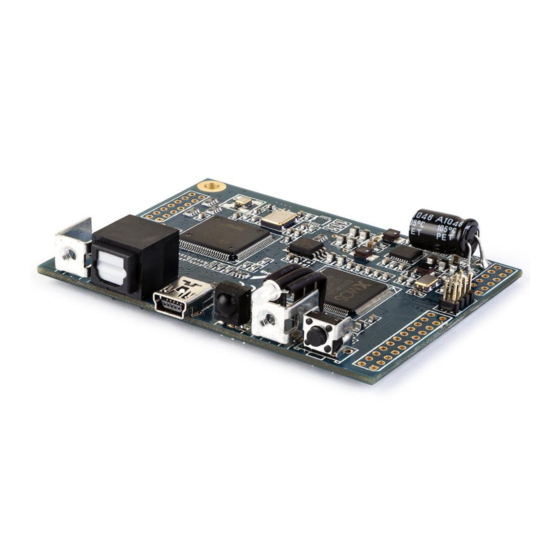Summary of Contents for miniDSP NANOSHARC
- Page 1 SHARC NANO UDIO ROCESSOR OARD User Manual miniDSP Ltd, Hong Kong / www.minidsp.com / Features and specifications subject to change without prior notice...
- Page 2 Revision history Revision Description Date V1.0 First version 22 Sept 2016 miniDSP Ltd, Hong Kong / www.minidsp.com / Features and specifications subject to change without prior notice...
-
Page 3: Table Of Contents
Infrared remote control ............................ 14 Additional information ............................15 Specifications ............................15 MCU firmware update ..........................16 Troubleshooting ............................17 Obtaining support ............................ 17 miniDSP Ltd, Hong Kong / www.minidsp.com / Features and specifications subject to change without prior notice... -
Page 4: Important Information
YSTEM EQUIREMENTS To configure the miniDSP audio processor, you will require a Windows PC or Apple Mac OS X computer with the following minimum specification: Windows • PC with 1GHz or higher processor clock speed. Intel® Pentium®/Celeron® family, or AMD K6®/AMD Athlon®/AMD Duron®... -
Page 5: Warranty Terms
Finally, note that the miniDSP audio processor is a very flexible device, and many of the questions we receive at the tech support department are already answered in this user manual and in the online application notes the miniDSP.com website. So please take the time to carefully read this user manual and the online technical support. -
Page 6: Product Overview
RODUCT VERVIEW Thank you for choosing the nanoSHARC audio processor board. The nanoSHARC is a tiny yet extremely powerful and flexible digital audio processing circuit board intended for OEM applications and advanced DIY enthusiasts. It includes an onboard optical digital input and asynchronous USB audio input. Audio output and additional audio inputs are to be provided by the system integrator via I2S interfaces. -
Page 7: Choosing A Plugin
1.2 C HOOSING A PLUGIN Currently, a single plugin is available for the nanoSHARC board. Its key features are summarized below. (This table will be expanded when future plugins become available.) Table 1. nanoSHARC plugins 2x4 HD1 DDRC-24 plugin Internal sample rate... -
Page 8: Board Layout And Connectivity
ONNECTIVITY This section describes the board and its interfaces. 2.1 B OARD LAYOUT This diagram shows the layout of the nanoSHARC board. 2.2 DC POWER Provide DC power between pins 9 and 10 (ground) and pins 11 and 12 (12 V DC) of header J2. The supply voltage must be 12V DC, or the board may malfunction or be damaged. -
Page 9: Usb Connectivity
Headers J2 and J5 are provided for connection of I/O circuitry via I2S. The pinouts are shown in Table 2 and Table 3. Note that I2C_SCL and I2C_SDA are intended for miniDSP use only – they are not documented or supported for other use. -
Page 10: I2S Details
The timing of data lines is determined by the bit clock and the word clock, as illustrated in the following diagram: The nanoSHARC board has four I2S input data lines and four I2S output data lines, each carrying two channels of audio. -
Page 11: Additional I2S Usage Notes
3. External digital input circuitry will need to use an asynchronous sample rate convertor to convert the incoming sample rate to the nanoSHARC’s clock domain. Figure 1. nanoSHARC I2S connections 2.8 A DDITIONAL USAGE NOTES Note that I2S is not a “plug and play” protocol. It requires attention to technical details such as clocking and wire layout. -
Page 12: Usb Audio
3 USB A UDIO The miniDSP nanoSHARC accepts stereo PCM audio at sample rates of 44.1, 48, 88.2, 96, 176.4, and 192 kHz on its USB audio input. The same USB connector is used both for streaming audio and configuration. -
Page 13: Windows
We recommend accepting the default installation location. Once the driver installation completes, click the Finish button. The Windows PC will not be able to communicate properly with the nanoSHARC if you did not have the nanoSHARC connected by USB and powered on when you installed the driver. If that is the case, you will need to uninstall the driver, connect the nanoSHARC, power it on, and run the installer again. -
Page 14: Infrared Remote Control
NFRARED REMOTE CONTROL An infrared remote can be used to control volume, mute, preset selection, and input selection. The nanoSHARC can “learn” the control codes of your current remote if it supports one of the following remote control codes: •... -
Page 15: Additional Information
Controls master volume, mute, digital input selection, preset selection. Power supply 12 V DC Dimensions (board only, H x W x D) 62 x 65 x 15 mm miniDSP Ltd, Hong Kong / www.minidsp.com / Features and specifications subject to change without prior notice... -
Page 16: Mcu Firmware Update
5.2 MCU FIRMWARE UPDATE miniDSP may occasionally provide an update to the processor's MCU firmware to enable new features. Currently, firmware upgrade is supported from the Windows platform only. DO NOT DISCONNECT THE USB CABLE OR POWER FROM THE PROCESSOR WHILE FIRMWARE UPDATE IS IN PROGRESS. -
Page 17: Troubleshooting
Confirm the version of the file. 5.4 O BTAINING SUPPORT 1. Check the forums on miniDSP.com to see if this issue has already been raised and a solution provided. 2. Contact miniDSP via the support portal at minidsp.desk.com with: a.











Need help?
Do you have a question about the NANOSHARC and is the answer not in the manual?
Questions and answers